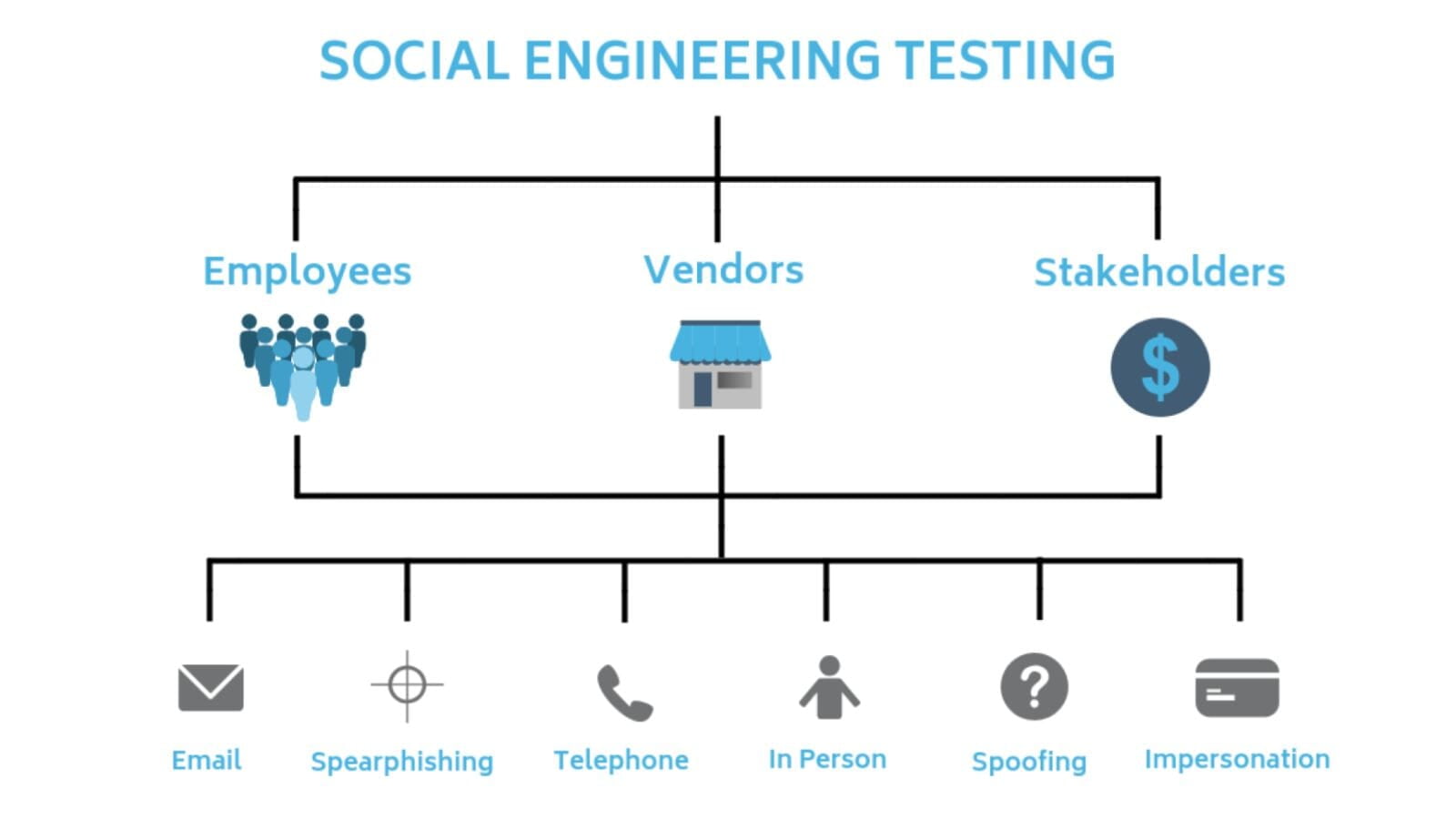
What is a Social Engineering Assessment?
A Social Engineering Assessment is a comprehensive evaluation of an organization's susceptibility to Social Engineering Attacks. By simulating real-world attack scenarios, including email phishing, vishing (voice calls), and on-site attempts to gain unauthorized access, we uncover vulnerabilities in your security posture and provide actionable insights to enhance your defenses.
Types of Social Engineering Attacks
Our tailored assessment engagements encompass a variety of authentic-feeling attacks designed specifically for your organization.
Common attack types include:
- Phishing: Deceptive emails or social media messages luring targets to spoofed websites to capture sensitive information.
- Spear Phishing: Falsified emails appearing to be from trusted sources to trick targets into divulging confidential information.
- Vishing: Phone calls impersonating internal employees or external partners to extract sensitive information.
- Physical Attacks: Testing employees' adherence to security procedures through USB drops, tailgating, or impersonating I.T. staff.

When Should You Conduct a Social Engineering Assessment?
Our clients find this service invaluable for testing employee compliance with established security protocols and identifying vulnerable gaps in their defenses. By validating the effectiveness of security awareness training and driving awareness of security procedures, organizations can proactively mitigate risks and bolster their security posture.
Key Challenges & Social Engineering Examples
Social Engineering Attacks present unique challenges for organizations, exploiting weaknesses in processes that are difficult to detect and prevent. Examples include phishing emails, vishing calls, and physical infiltration techniques like tailgating or badge cloning.
Types of Social Engineering Testing
Our assessments encompass both on-site and off-site testing methodologies, evaluating an organization's security posture against a variety of attack vectors. From tailgating and badge cloning to phishing emails and vishing calls, our comprehensive testing approach uncovers vulnerabilities across all fronts.
Why Choose Annexus Technologies for Social Engineering Assessments?
- Dedicated Social Engineers: Our experienced team employs detailed testing methodologies to assess your organization's capabilities effectively.
- On-call Assistance: We offer expert advice and support post-assessment to address any concerns during the implementation of remedial actions.
- Detailed Reporting: Our bespoke reports provide specific vulnerability details, methods used, and visual evidence for measurable results.
- Customer Promise: With a 100% satisfaction guarantee, we ensure a thorough testing methodology that identifies potential vulnerabilities and security risks.
- Stakeholder Workshops: We engage with stakeholders to ensure they understand assessment results and address any concerns.
- Retesting Included: We offer retesting to verify the effectiveness of remedial actions, providing a summary report upon completion.
Benefits of Conducting Regular Social Engineering Tests
Regular social engineering tests are an essential component of a comprehensive cybersecurity strategy, offering numerous benefits that extend beyond just identifying vulnerabilities.
By proactively simulating real-world attack scenarios, organizations can:
Benchmark Security Awareness Levels: Social engineering tests provide a valuable benchmark for evaluating the effectiveness of security awareness training programs. By assessing employee responses to simulated attacks, organizations can gauge the level of awareness and readiness to identify and respond to potential threats.
Identify Operational Weaknesses: Beyond assessing individual employees' susceptibility to social engineering tactics, these tests also help identify broader operational weaknesses within the organization. By examining how different departments and teams respond to simulated attacks, organizations can pinpoint systemic vulnerabilities in processes, policies, and procedures.
Provide Insights into Overall Security Effectiveness: Social engineering tests offer valuable insights into the overall effectiveness of an organization's security posture. By uncovering vulnerabilities that may not be apparent through traditional security assessments, such as penetration testing or vulnerability scanning, organizations can gain a more comprehensive understanding of their security posture and prioritize remediation efforts accordingly.
Enhance Incident Response Preparedness: Regular social engineering tests also help organizations improve their incident response preparedness. By simulating realistic attack scenarios, organizations can identify gaps in their incident response procedures and develop more effective response plans to mitigate the impact of potential breaches.
Drive Continuous Improvement: Perhaps most importantly, regular social engineering tests foster a culture of continuous improvement within the organization. By regularly assessing and addressing vulnerabilities, organizations can adapt and evolve their security strategies to stay ahead of emerging threats and protect sensitive data and assets effectively.
Request a Security Testing Quote today to partner with Annexus Technologies and safeguard your organization against evolving cyber threats.

